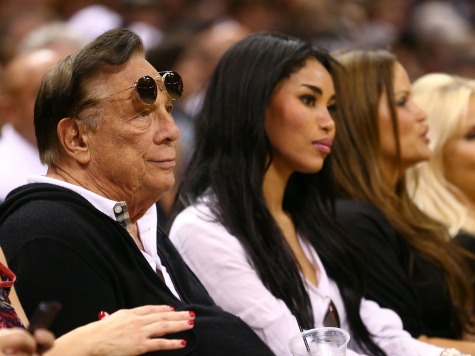Are rights a reward that the state bestows upon citizens for good behavior?
The extended two-minute hate now focused on Los Angeles Clippers owner Donald Sterling compels such heretical questions. Jerks, one surmises from the public reaction to the controversy, don’t possess rights that duty commands good people to respect.
Al Sharpton thinks what Sterling thinks should be grounds for expropriating his billion-dollar basketball franchise. “No one should be allowed to own a team if they have in fact engaged in this kind of racial language,” the hype-man for Tawana Brawley and inciter of that mob outside the itching-to-be-incinerated Freddie’s Fashion Mart observed. He believes Sterling should be “immediately dealt with.”
Others celebrate V. Stiviano as a “hero” for going NSA on Sterling’s phone conversations. Stiviano, who boasts numerous identity-shielding aliases and a futuristic Cobra Commander mask to protect from the paparazzi’s gaze, surely appreciates privacy. Does Sterling forfeit the rights she enjoys by virtue of his racism?
Reviling such a loathsome figure seems almost natural. “Don’t come to my games,” Sterling told his mixed-race girlfriend. “Don’t bring black people, and don’t come.” Elsewhere, he pleads with his paramour not to pose for pictures with African Americans. Given that African American players and fans may help make Sterling more than a billion dollars by the time he sells his team, the comments come off as much as a show of ingratitude as they do a demonstration of bigotry.
He makes the NBA look bad. Worse still, he represents octogenarians horribly. Eighty-year-old people may have suffered from his tics eighty years ago. Few do today. Blame his age at the risk of indicting an innocent group and relieving the guilty individual of responsibility.
Stiviano and Sterling may be at different stages of life and adversaries in the press. They otherwise make a nice pair. S&S share an attraction to the glamor of evil. She saw him as a $ and he saw her as an orgasm. Neither saw the other as a person. Since we’re on the subject of subhuman behavior, an obvious observation: dogs attract fleas. If the old line that “you don’t pay a whore for sex you pay her to leave” defines the oldest profession, then Stiviano, who reportedly received a Ferrari, a Range Rover, a quarter-million in cash, and other goodies from the eighty-year-old Sterling, is no hooker.
So brazen has been Sterling’s quid-pro-quo affair that it paradoxically masks the fact of his adultery. His Staples Center appearances next to a woman a half-century his junior mesmerizes observers into forgetting that the man cheats on his wife of 57 years and rubs it in her face in front of the cameras. Women, as much as blacks, he dehumanizes.
If Donald Sterling isn’t a bad guy, who is? Such grossness rarely sits contently contained. The feelings of superiority ginned up in viewers by the pixelated visage of one whose physiognomy shouts “decadence” the way his courtside courtesans shout “herpes” are hard to overstate. He’s national catharsis. He tempts in onlookers self-indulgence for self-righteousness. Bad people make us feel good. They also make us do bad. Sinners make us preachy.
The injustice Donald Sterling harbors in his heart against African Americans justifiably provokes the NBA to come up with ways to rid themselves of their embarrassment. But one doesn’t combat injustice with injustice. Adam Silver, citing powers entrusted to him by owners including Sterling, banned the Clippers owner for life and took about one-tenth of one percent of his fortune in a fine on Tuesday. The 29 other owners should further encourage Sterling to sell what will lose value if he doesn’t divest. Collectively, they should quickly buy the team from an owner not worthy of his coach, players, or fans. But they shouldn’t take what doesn’t belong to them. They should follow the rules, and not Donald Sterling’s example of breaking them in unilaterally moving the Clippers from San Diego to Los Angeles, in resolving the crisis.
Before NBA Commissioner Adam Silver spoke on Tuesday afternoon, the market did. Sponsors, fans, and players no longer wished to enrich Sterling. The “ban” really didn’t come from the NBA. It came from the people who play in the NBA, people who watch the NBA, and people who take out ads during those NBA games. Donald Sterling didn’t need the NBA commissioner to tell him he can no longer own the Clippers. The market told him that. Adam Silver merely gave voice to its wishes. Let the market, not a mob of bigots feigning to decry bigotry, take his team from him.
Even really, really, really dreadful people don’t deserve their phone conversations put on blast. Their property shouldn’t belong to them on condition of good behavior. In solving a problem like Donald Sterling, “WWDSD?” shouldn’t be the question that guides.
Daniel J. Flynn, the author of The War on Football: Saving America’s Game (Regnery, 2013), Blue Collar Intellectuals, (ISI Books, 2011), A Conservative History of the American Left (Crown Forum, 2008), and other books, edits Breitbart Sports.

COMMENTS
Please let us know if you're having issues with commenting.